A new global challenge against platform capitalism
by
Clara Mogno
November 5, 2018
Featured in The Transnational Courier Federation (#5)
‘The counterattack is based on rights, wages and collective solidarity across Europe.’

inquiry
A new global challenge against platform capitalism
by
Clara Mogno
/
Nov. 5, 2018
in
The Transnational Courier Federation
(#5)
‘The counterattack is based on rights, wages and collective solidarity across Europe.’
This article by Clara Mogno was originally published in Il Manifesto.
An assembly of bicycle couriers from twelve different countries has founded the first transnational federation against Uber, Foodora and Deliveroo. The counterattack is based on rights, wages and collective solidarity across Europe.
From the heart of Europe, a new front has been launched against Deliveroo, UberEats, Glovo and Foodora. 60 food delivery platform workers, locally organised in collectives or unions hailing from 12 different countries (Austria, Belgium, Finland, France, Germany, Holland, Ireland, Italy, Norway, Spain and the UK) met in Brussels for an assembly which gave birth to the first Transnational Federation of Couriers.
The workers advanced many demands, but the most important and urgent ones are two. On the one hand, the abolition of the piecework system and a demand for an hourly wage. On the other, a demand for transparency in the platforms’ use of algorithms and user data. A principal characteristic of the digital transformation [traduzione digitale] of work is in fact the return to piecework, in this case payment per delivery. The system of retribution is based on the performance of “self-employed” contractors, often calculated on the number of kilometers travelled by the worker. Not counted are the hours which couriers spend waiting for deliveries in squares and street corners, with their backpacks serving as veritable billboards for the companies. The more you ride, the more you earn. But so the more do you rush to your next delivery, risking accidents and injuries which have sadly come to fill the news.
But the real wealth of platform capitalism - proclaim the couriers - is data. How does the algorithm work? How are deliveries assigned to workers? And above all: what do these platforms do with all the data they gather? What we know for certain is that Deliveroo - after mapping cities for a number of years, after determining with scientific precision the culinary customs, tastes and purchasing power of consumers - has built so-called “dark kitchens” under the name of “Roo editions”. In France and the UK, in peripheral areas of large cities, these kitchens prepare the food which was previously supplied by restaurants. The company is thus no longer a simple intermediary: it seeks to replace restaurants, to eliminate them from the labour relation which ties the platform to the workers. After years of gathering data, Deliveroo can finally bring its consumption mapping to profitable use. The source of this wealth - demand the couriers - belongs and should be returned to us all: workers as well as consumers.
The appeal has been launched from Brussels, and the projected struggle immediately takes on a transnational character. Platform capitalism operates across the globe, but differentially. Now more than ever, it is essential for all workers in the so-called “gig economy” to be able to access inquiries on the many local forms of exploitation. This would allow for the prediction of possible transformations in each country. At the same time, workers must prepare a counterattack which does not limit itself to Europe, but which can fight in the same weight-class as the platforms themselves; that is to say, on a planetary scale.
The abolition of competition between workers fostered by gamification and piecework. The creation of transnational and transcontinental alliances. Help and guidance for all who seek to struggle against digital exploitation. The formation of an open and solidary federation which advances an intersectional struggle. These are the aims of the first Transnational Federation of Couriers.
Uber, which has just announced Uber Works, will not have it easy. The challenge is on.
Featured in The Transnational Courier Federation (#5)
author
Clara Mogno
Subscribe to Notes from Below
Subscribe now to Notes from Below, and get our print issues sent to your front door three times a year. For every subscriber, we’re also able to print a load of free copies to hand out in workplaces, neighbourhoods, prisons and picket lines. Can you subscribe now and support us in spreading Marxist ideas in the workplace?
Read next

Towards an Organized Tech Industry—Part One
by
Wendy Liu
/
July 15, 2018

